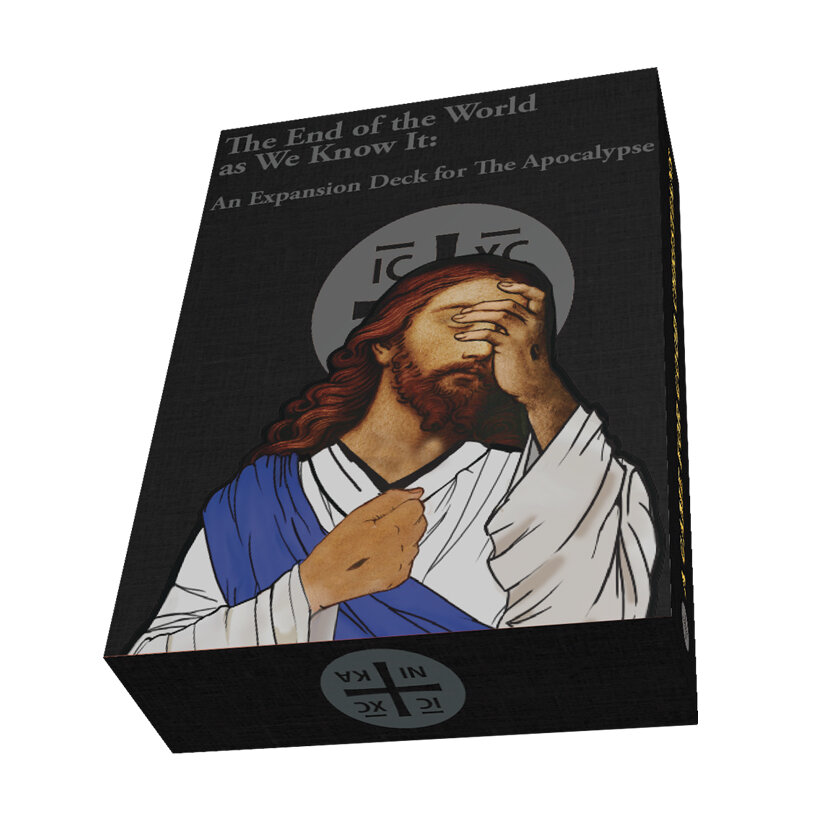Note: This is our first Card Talk from our The End of the World as We Know It: An Expansion Deck for the Apocalypse.
The Biblical Story
In chapter 5 of the Book of Daniel, the Babylonian king Belshazzar is throwing a feast in his palace. The party is had on the backs of stolen labor and stolen goods. But, in Belshazzar’s “defense,” he didn’t steal the Jewish people (the ones who weren’t murdered outright, or died while being force-marched across the landscape), or steal their material goods: his father did that. Sure, he was still directly benefiting from those horrible actions, and was in no way attempting to address those wrongs, but can you really blame a guy for his inaction, and the perpetuation of a system that oppresses others, when he wasn’t the one to put the whole system into motion?
Belshazzar’s party is disrupted when a ghostly, giant hand writes mystical words on the wall. The festivities are further complicated because they don’t know what the words on the wall mean, they can’t read them. Belshazzar doesn’t know what to do. His friends and advisors and wisest men are no help.
The decision is made to call their token Jewish “friend,” one of those stolen Jews (but remember, that’s their fathers’ fault, not theirs). They hope he will have an answer, as he is wise, and the script looks like something his (lesser) people dabble in. They call Daniel.
And Daniel is able to read the writing on the wall. But Belshazzar is suddenly confronted with his privilege, his family crime. He is being judged for the systemic injustices at the heart of his empire, even if daddy dearest set them in motion.
Condemnation hangs over them.
Chickens are coming home to roost.
The whirlwind is being reaped.
{An Excursus (of sorts)}
A business man in his prime is out celebrating with friends, spending the money he inherited from his father. Money his father earned stepping on the backs of others. Shady land deals. Predatory lending practices. Resources “borrowed” from pensions. The results of unpaid invoices for an honest day’s labor. Lawsuits and insider trading that left people penniless. The business man knows, vaguely, about what his father was into, but doesn’t consider that any of his concern.
A waiter bumps into the table. Spills a glass of water, not on the man, but close enough. From one of the business man’s friends, the waiter receives a racial slur amid the rest of the verbal reward for his clumsiness. This is not an unusual occurrence, but it will be the straw that will break the waiter’s back. He will lose his job, but the things he said have left a mark on the business man.
Sure, maybe (maybe) he should have chided his friend for his use of such language—on this occasion and in the past—but he is certainly not a “racist.” He volunteers in the “ghetto.” He voted for Obama. Twice. He felt Trump should have tweeted less. He’s progressive, educated, and cultured. He loves Beyoncé.
He calls his roommate from freshman year in college, the only Black person in his smart phone that doesn’t work for him. He explains what happened.
Silence.
He then begins to ask him the question, to soothe his aching self-identity.
There’s more silence over the line.
And then a deep sigh.
And then his lone Black “friend,” exhausted, tells him the truth...
The Writing on Belshazzar’s Wall
וּדְנָה כְתָבָא דִּי רְשִׁים מְנֵא מְנֵא תְּקֵל וּפַרְסִֽין׃
MENE TEKEL PARSIN
The writing was in Aramaic which, without the vowel pointing present, could not be read by the Babylonians. But this is common, even today: the oppressor seldom learns the language of the oppressed.
The same three consonants can be used as a noun or a verb, depending on the vowels and the conjugation. In this case, the noun forms of the writing on the wall were types of currency of the day, while the verbs are upon what Daniel is giving his prophetic word.
“This is the interpretation of the matter:
mene, God has numbered the days of your kingdom and brought it to an end;
tekel, you have been weighed on the scales and found wanting;
peres, your kingdom is divided and given to the Medes and Persians.”…
That very night Belshazzar, the Chaldean king, was killed. And Darius the Mede received the kingdom, being about sixty-two years old. (Daniel 5:26-31)
“tekel, you have been weighed on the scales and found wanting” (Daniel 5:27)
A Thought Experiment
Imagine that words have weight. Not metaphorically. Not emotionally (for they already have both). We mean real weight. Actual mass. In pounds or grams or whatever system makes you feel the most at home.
Imagine your words as perfect cubes, blocks of granite. Each word weights exactly the same. It doesn’t matter if the word is kind or cruel, a word of healing or hurting.
Now imagine there is a scale called “outrage.”
Place on one side all the words you’ve said related to treatment of the poor, the widows, the orphans, the stranger, the abused by unjust authority, the exploited, the discriminated against.
Place on the other side all the words you’ve said that ignores the plight of the hurting, so you can justify some personal or political point of view. They might include references to “both sides,” “reverse racism,” or “all lives/blue lives matter.” They might include questions like “what was she wearing?” and “why didn’t he just follow their commands?” They might include xenophobic nationalism masquerading as patriotism, forgetting that Jesus said the Kingdom of God/Heaven is not of this world, is not the United States, or anywhere else pretending it’s a “Christian nation.”
Now ask yourself
Which side weighs more?
Now image you put actions on those scales…
Perhaps now is a good time for you to put the glass down and listen to the silent stylus scratching, the writing on the wall.
Perhaps you should take stock of your complicity in the oppression of others, despite your many reasons for saying, it has nothing to do with you. That you’re not a racist - sexist -homophobe - transphobe - ageist - ableist - elitist - [insert other assholery] because of [insert the ‘close personal friend/relative’ (who really isn’t)].
Perhaps you should figure out what they have been trying to tell you, but you’re too sure of yourself, sure of your ideas, to hear.
Before it’s too late.
But what do we know, we made this game and you probably think we’re going to Hell.


